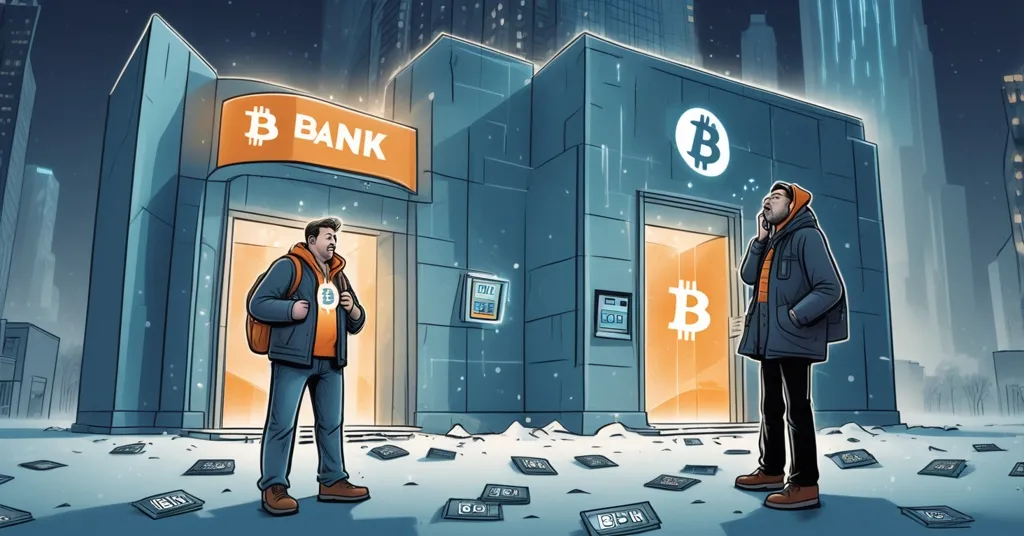Major U.S. Banks Deny $22,450 in Fraud Claims, Exposing Systemic Flaws vs. Bitcoin’s Potential

Banking Scams Exposed: JPMorgan, BofA, and Wells Fargo Deny $22,450 in Fraud Reimbursement
Major U.S. banks—JPMorgan Chase, Bank of America, and Wells Fargo—have left customers in the lurch, refusing to reimburse a combined $22,450 lost to cunning scams. From impersonation schemes to phishing texts, these cases reveal a broken traditional banking system that often prioritizes rigid policies over protecting its own. As trust erodes, we’re digging into these infuriating stories and contrasting them with the raw potential—and real pitfalls—of decentralized tech like Bitcoin and blockchain.
- Total Loss: $22,450 across three major banks due to sophisticated fraud.
- Bank Denials: Initial refusals to reimburse, blaming customers for “authorized” transactions.
- Systemic Failures: Exposed by CFPB lawsuits and consumer advocacy, highlighting flaws in fraud protection.
Betrayal by the Big Three: Unpacking the Scams
Scott Merovitch, a Wells Fargo customer for nearly 40 years, endured a gut-wrenching loss of $20,000 to an impersonation scam so audacious it could be a movie plot. Fraudsters, posing as bank staff, called him with fake urgency. Then, in a chilling twist, they showed up at his home, convincing him to destroy his debit card as part of their “security protocol.” Within hours, they drained his account through nearby ATM withdrawals. When Scott pleaded for help, Wells Fargo’s response was ice-cold: the transactions were “authorized.” Only after media pressure did they agree to “take another look,” with no confirmed resolution yet, as detailed in recent updates on banking fraud trends. How does a bank let a loyal customer down so spectacularly?
Across the board at JPMorgan Chase, another victim fell for a phishing text disguised as Apple support. For those new to the term, phishing scams are fraudulent messages—often via text or email—designed to trick you into sharing sensitive info or downloading malicious software. Here, a single click likely installed malware on the customer’s iPhone, giving scammers access to their bank account for unauthorized transactions. Chase’s response? A flat denial of reimbursement. Their official line reads:
“After further review, our claim denial stands as we found these transactions were authorized by the customer with no evidence of fraudulent account takeover or of a compromised device.”
No evidence of compromise? Malware can erase its tracks, and scammers know exactly how to exploit urgency—like fake warnings of a hacked account—to bypass skepticism. Chase’s stance feels like a dodge, leaving the victim to bear the loss while the bank hides behind procedural fine print, a pattern highlighted in reports of denied reimbursements by major banks.
Then there’s Keith Lee, a Bank of America customer stung by a $450 overcharge for a $10 taxi ride in Panama. This wasn’t just a bad fare; it’s a well-known scam in tourist spots where drivers manipulate transactions—here, absurdly logged as “software” on the statement—using chip-verified cards to appear legit. Bank of America initially denied the dispute, citing the chip verification as proof of consent. It took consumer advocate Christopher Elliott’s intervention for the bank to reverse the charge, admitting such taxi scams are “well-known.” If they knew about the pattern, why the initial rejection? Smells like negligence at best, and at worst, a calculated shrug until someone forces their hand, as explored in Elliott’s advocacy work on this case.
Systemic Decay: Zelle and the Fraud Free-for-All
These aren’t just one-off failures; they’re symptoms of a rotting financial core. The Consumer Financial Protection Bureau (CFPB) has slammed lawsuits on JPMorgan Chase, Bank of America, Wells Fargo, and Early Warning Services, the operators of Zelle—a popular peer-to-peer payment app owned by these banks that enables near-instant money transfers. Since its 2017 launch, Zelle has processed trillions in transactions but, as CFPB Director Rohit Chopra bluntly put it, has turned into a haven for scammers, a problem underscored by numerous fraud complaints tied to Zelle.
“By failing to put in place proper safeguards, Zelle became a gold mine for fraudsters, while often leaving victims to fend for themselves.”
The CFPB alleges violations of federal law, pointing to weak identity checks and a failure to track repeat offenders across banks. Near-instant transfers are a scammer’s dream—once the money’s gone, good luck getting it back. With hundreds of thousands of fraud complaints tied to Zelle alone, the $22,450 lost in these cases is a mere speck in a massive, leaky system. What’s worse, banks lean on automated AI dispute systems with zero human oversight, often ignoring red flags—like a $450 “software” charge from a taxi—until escalated to executives or regulators. Wells Fargo’s excuse that this is an “industry-wide issue” doesn’t wash when they co-own the platform enabling much of the mess, a failure detailed in CFPB’s legal action against these banks. Accountability, anyone?
The Human Cost: Beyond the Dollars
Losing $20,000, as Scott Merovitch did, isn’t just a financial hit—it’s a psychological sledgehammer. Victims of banking scams often grapple with intense stress, sleepless nights, and a shattered sense of security, knowing their trusted institution turned its back. For retirees or those on tight budgets, such losses can delay medical care or cripple monthly bills, spiraling into long-term hardship. A 2022 AARP study found that fraud victims over 50 are especially prone to emotional fallout, often burdened with shame for “falling for it”—a guilt banks amplify by pinning blame on “authorized” actions, an issue echoed in community discussions on Wells Fargo’s fraud handling.
The ripple effect spreads wider. Entire communities lose faith not just in banks but in digital finance broadly, slowing adoption of legitimate innovations. Scammers, meanwhile, grow bolder, targeting vulnerable groups with ever-sharper tactics, especially during high-risk periods like the holiday season, as noted by the CFPB. For us in the crypto space, this is a sobering parallel: while we push for user-controlled finance, we’ve got to ensure our ecosystem doesn’t replicate this despair through poor education or unsecured systems. Banks are failing their flock, but decentralized tech must prioritize empowerment over blind hype to avoid the same trap.
Blockchain’s Edge: Bitcoin and Beyond
Let’s shift gears to why this hits home for our Bitcoin and crypto crowd. Traditional banking’s centralized grip—where a few institutions control your funds and dictate your recourse—is starkly exposed here. You’re at their mercy, with opaque records and no real power if they label your loss “authorized.” Bitcoin flips this script with self-custody: “not your keys, not your crypto.” You hold the reins via private keys, and blockchain’s public ledger offers transparency to track funds if fraud strikes—something banks rarely match.
Picture Scott Merovitch’s $20,000 loss on a Bitcoin blockchain. The immutable record—think of it as an unchangeable digital log—could reveal exactly where his funds went, potentially exposing the scammer’s wallet address for law enforcement to chase. Real-world cases back this up: after the 2016 Bitfinex hack, blockchain analysis helped trace millions in stolen Bitcoin, leading to recoveries years later. Banks, with their hidden ledgers, can’t offer that clarity. As Bitcoin maximalists, we’d argue BTC’s simplicity and security make it the ultimate bastion of value, free from the bloat of exploitable features. It’s hard money, pure and simple.
That said, let’s not ignore altcoins’ role. Platforms like Ethereum bring programmable money through smart contracts—digital agreements that auto-execute actions when conditions are met, like a vending machine dispensing without a middleman. Imagine a smart contract refunding funds if a transaction flags as fraudulent, cutting out bank bias or delay. Of course, this isn’t foolproof; crypto’s wild west has its own scams—phishing sites stealing keys, DeFi rug pulls, you name it. Lose your keys, and there’s no CFPB hotline to save you. Decentralization hands you power, but it’s a double-edged sword if you’re not vigilant.
Lessons Learned: Protecting Yourself in Any System
Whether you’re stuck with a bank or diving into crypto, these scams hammer home the need for personal vigilance. In traditional finance, set up transaction alerts and never share sensitive info like PINs or passwords—verify identities independently by calling official numbers, not ones provided by unsolicited contacts. Watch for phishing red flags: fake urgency, odd URLs, or grammar slips in texts and emails. Two-factor authentication (2FA) adds a layer of defense, requiring a second verification step beyond just a password.
In the crypto realm, the stakes are higher but the rules echo: secure your private keys like your life depends on it—use hardware wallets for big sums, not hot wallets on sketchy apps. Distrust any unsolicited request, even if it looks legit; scammers mimic exchanges or support teams with eerie precision. Both systems demand skepticism and proactive steps, because neither banks nor blockchains will hold your hand if things go south. Systemic gaps exist everywhere—it’s on you to plug them as best you can, a sentiment reinforced by victim frustrations over denied fraud claims at Bank of America.
Key Questions and Takeaways on Banking Fraud and Decentralized Alternatives
- Why do major banks often deny fraud reimbursement claims?
Banks like Wells Fargo and JPMorgan Chase prioritize cost-saving and strict policies over customer protection, blaming “authorized transactions” to avoid liability, even when patterns like taxi scams are known, as Bank of America’s initial denial showed. - How does banking’s fraud response stack up against crypto’s self-custody model?
Banks leave victims exposed with little recourse, while crypto empowers users via private keys—though losing them means no safety net, unlike banking’s flawed dispute mechanisms. - Can blockchain technology help solve banking fraud problems?
Blockchain’s transparent, unchangeable ledger could track fraudulent transactions and expose scammers, while smart contracts might automate fair dispute resolution, though privacy and scaling issues linger as hurdles. - What practical steps can consumers take to stay safe?
In banking, use transaction alerts and verify identities independently; in crypto, secure private keys with hardware wallets and distrust unsolicited messages—both require relentless personal caution. - What reforms are urgently needed in traditional banking?
Banks must overhaul fraud safeguards, improve identity verification, and ditch automated dispute systems for human oversight—CFPB lawsuits may force change, but only if pressure persists.
Pushing for Disruption: The Road Ahead
These banking nightmares—$22,450 lost, countless lives upended—aren’t just about money. They expose a fractured trust in institutions meant to safeguard our financial world. The CFPB’s push for penalties and redress might nudge some reform, but scammers evolve faster than policies. Wells Fargo’s tepid “we’ll take another look” and Bank of America’s reversal only under duress prove that change comes from public outcry, not corporate goodwill.
For the crypto community, this is fuel for our fire. Bitcoin and blockchain aren’t just tech—they’re a rebellion against a failing status quo, offering transparency and control that banks can’t muster. Yes, our space has its own chaos—don’t even get me started on the laughable “$10 million BTC by tomorrow” shills clogging X—but the power to secure your wealth starts with you. As CFPB lawsuits unfold and more victims surface, the real question is whether enough people will ditch the old guard and accelerate toward decentralized solutions. We’re betting on it, flaws and all, with a fierce optimism that disruption is the only way forward. Zelle might be fast for payments, but scammers are faster—let’s build something better.



